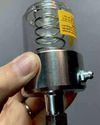
The storage of lubricants in 1000 liter deposits is quite common in the vast majority of industrial areas and is the preferred type of storage especially in power generation plants that have gas or steam Turbines, compressors and turbochargers.
The oil in these containers can be stored for a long time until it is necessary to transfer it to the generation system and in many cases this is where some problems begin.
This article addresses a couple of case studies in order to guide the end user on the necessary considerations that must be taken into account when working with this type of containers and, above all, reveals the impact it has on the availability of the power generation group.
Case 1: Stored oil
Perhaps one of the main questions when buying oil in this type of container is, how long does the oil last? Redirecting the question from a more technical aspect, the end user wants to know the time he has to store the oil without changing its properties and functional characteristics. For strictly commercial reasons, the combined cycle (2 gas turbines and one steam turbine) which we will call "CCA" had up to 18,000 liters of ISO VG 32 oil stored in IBC tanks.
Among the doubts of the plant O&M team was knowing the possibility of putting the stored oils into service. A question formulated in time can avoid many problems, as we will see in the following case. With the help of a manual pump, a sample was taken as close as possible to the central part of each tank and the results of the oil analysis were decisive in knowing its status. The following graph shows the percentage of IBC's with oils above the acceptable limits of water and solid contamination, as well as those samples with clear evidence of loss of organic additive (the one that slows down the effect of oxidation in these formulations) and signs of degradation of the base oil.
Esta historia es de la edición July - August 2022 de MACHINERY LUBRICATION INDIA.
Comience su prueba gratuita de Magzter GOLD de 7 días para acceder a miles de historias premium seleccionadas y a más de 9,000 revistas y periódicos.
Ya eres suscriptor ? Conectar
Esta historia es de la edición July - August 2022 de MACHINERY LUBRICATION INDIA.
Comience su prueba gratuita de Magzter GOLD de 7 días para acceder a miles de historias premium seleccionadas y a más de 9,000 revistas y periódicos.
Ya eres suscriptor? Conectar

The Secrets For Implementing A Clean lubricant Program
If you could find an investment that guaranteed a return 40 times greater than your initial investment, you probably wouldn't pass it up.

MAINTAIN? REPAIR? REPLACE?
When considering the life of any asset, the question arises: what types of interventions should be planned to keep it operating or to restore operation in the event of its failure?

Engineering Reports Should Be Like Bad Movies
I'm frequently asked to review engineering reports, and I'm continually baffled by how many engineers want to take their readers on a journey instead of getting to the point.

WHY SCHEDULED OIL CHANGES AREN'T ENOUGH TO MITIGATE LUBRICANT CONTAMINATION
There are few problems more insidious or damaging to large industrial machinery than contaminated lubricant.

LUBRICATION CONTAMINATION PREVENTION
How many articles have you read, or seminars listened to, that tout the value of contamination control? If you are like me, they number in the hundreds—if not thousands. One thing about these articles and seminars that bothers me is the word “control”.

LUBRICANT CONTAMINATION PREVENTION AND MITIGATION: A Guide For Maintenance Professionals
Lubricants are essential for the smooth and efficient operation of many types of machinery, from engines and turbines to gears and bearings.

TASK-BASED TRAINING | INSPECTING A SINGLE-POINT LUBRICATOR
A single-point lubricator is a device engineered to attach to a single unit to regularly and automatically deliver a small amount of clean grease or lubricating oil to a specific area.

TOP LEADERSHIP FOCUSES FOR IMPROVED RELIABILITY AND COST REDUCTION
Here’s a scenario that may sound eerily familiar – you have a new reliability initiative.

4 KEY ELEMENTS FOR INTERPRETING AN OIL ANALYSIS REPORT
Years ago, a customer came into my office, visibly upset. He had just received his second oil analysis report for one of his Caterpillar gas engines.

ASTM ENHANCEMENTS TO MICROSCOPIC PARTICLE IDENTIFICATION AND DOCUMENTATION
In 1982, Daniel Anderson published his influential book, \"Wear Particle Atlas\", which describes, sizes, and classifies particles found in oil.